|
Books Should Be Free Loyal Books Free Public Domain Audiobooks & eBook Downloads |
|
|
Books Should Be Free Loyal Books Free Public Domain Audiobooks & eBook Downloads |
|
Literature |
|---|
|
Book type:
Sort by:
View by:
|
By: Frances Hodgson Burnett (1849-1924) | |
|---|---|
 Lodusky
Lodusky
| |
 One Day At Arle
One Day At Arle
| |
 "Surly Tim" A Lancashire Story
"Surly Tim" A Lancashire Story
| |
By: Charlotte Brontë (1816-1855) | |
|---|---|
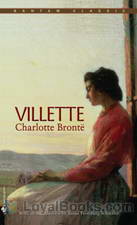 Villette
Villette
Villette was Charlotte Bronte's last published novel. It came out in 1853, just two years before her death in 1855. It is a poignant, strangely lonely and sad work, steeped in conflict between society's demands and personal desires. Set in the fictional town of Villette in France, it is the story of the young and intelligent Lucy Snowe, the narrator in the book. She is described by another character in the book as having “no beauty...no attractive accomplishments...” and strangely seems to lack a personal history or living relatives... | |
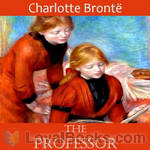 The Professor
The Professor
The book tells the story of a young man named William Crimsworth. It describes his maturation, his loves and his eventual career as a professor at an all-girls’ school. | |
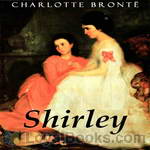 Shirley
Shirley
Shirley is an 1849 social novel by the English novelist Charlotte Brontë. It was Brontë's second published novel after Jane Eyre (originally published under Brontë's pseudonym Currer Bell). The novel is set in Yorkshire in the period 1811–1812, during the industrial depression resulting from the Napoleonic Wars and the War of 1812. The novel is set against a backdrop of the Luddite uprisings in the Yorkshire textile industry. | |
 Biographical Notes on the Pseudonymous Bells
Biographical Notes on the Pseudonymous Bells
| |
By: Robert Louis Stevenson (1850-1894) | |
|---|---|
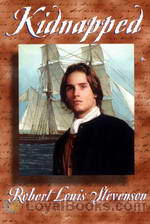 Kidnapped
Kidnapped
Kidnapped is the story of a 16-year old young man who is searching for his true birthright and is determined to make a fortune after the death of his parents. This timeless tale by Robert Louis Stevenson follows the life of David Balfour who leaves his home in Scotland after the death of his parents. First he meets his uncle for the first time in his life. His uncle is a very mean person who, at first, tried to kill David by devious means but then got him kidnapped onto a slave ship. In the ship, David makes friends with a Scottish rebel and together they successfully defeat the ship’s crew... | |
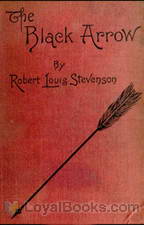 The Black Arrow; a Tale of Two Roses
The Black Arrow; a Tale of Two Roses
The Black Arrow tells the story of Richard (Dick) Shelton during the Wars of the Roses: how he becomes a knight, rescues his lady Joanna Sedley, and obtains justice for the murder of his father, Sir Harry Shelton. Outlaws in Tunstall Forest organized by Ellis Duckworth, whose weapon and calling card is a black arrow, cause Dick to suspect that his guardian Sir Daniel Brackley and his retainers are responsible for his father’s murder. Dick’s suspicions are enough to turn Sir Daniel against him, so he has no recourse but to escape from Sir Daniel and join the outlaws of the Black Arrow against him... | |
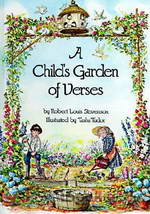 A Child's Garden of Verses
A Child's Garden of Verses
Beloved by many generations of children, A Child’s Garden of Verses is a beautiful collection of children’s poetry. Sometimes thoughtful, sometimes whimsical, but always fun. | |
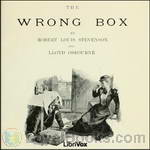 The Wrong Box
The Wrong Box
The Wrong Box is a comedy about the ending of a tontine (a tontine is an arrangement whereby a number of young people subscribe to a fund which is then closed and invested until all but one of the subscribers have died. That last subscriber then receives the whole of the proceeds). The story involves the last two such survivors and their relations, a train crash, missing uncles, surplus dead bodies and innocent bystanders. A farce really. | |
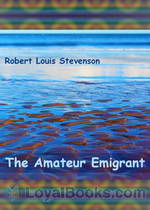 The Amateur Emigrant
The Amateur Emigrant
In July 1879, Robert Louis Stevenson left Scotland to meet his future wife in her native California. Leaving by ship from Glasgow, Scotland, he determined to travel in steerage class to see how the working classes fared. At the last minute he was convinced by friends to purchase a ticket one grade above the lowest price, for which he was later thankful after seeing the conditions in steerage, but he still lived among the ‘lower’ classes. His comments on the experience make interesting reading. His father however was so shocked at the thought of his son associating with people ‘beneath him’ that the work was not published for a number of years, | |
 Olalla
Olalla
“Olalla” was a “shilling shocker” written for the Christmas season in 1885, just before the publication of Stevenson’s Dr. Jekyll and Mr. Hyde. The nameless protagonist of this Gothic tale, a wounded soldier, goes to the Spanish countryside to recuperate. He finds himself enthralled by the beautiful Olalla, the daughter of his hostess, whose family conceals a terrible secret. | |
 Essays in the Art of Writing
Essays in the Art of Writing
| |
 Master of Ballantrae
Master of Ballantrae
| |
 Travels with a Donkey in the Cevennes
Travels with a Donkey in the Cevennes
| |
 In the South Seas
In the South Seas
| |
 Island Nights' Entertainments
Island Nights' Entertainments
A marvelous depiction of two sides of South Sea Islands' life through three separate tales. One, the experience of the incoming British keen to live free and exploit the innocent; the other the supernatural as perceived by Stevenson working in the lives of the natives. One tale carries the germ of the story of Madame Butterfly, since become a part of Western culture. Another is an extraordinary retelling of a German horror story transposed to a South Sea Island setting. The last is an effort of the pure Stevensonian imagination and there can be nothing better. | |
 A Christmas Sermon
A Christmas Sermon
| |
 Fables
Fables
| |
 Travels with a Donkey in the Cevennes
Travels with a Donkey in the Cevennes
A classic of travel writing, this book recounts Stevenson's adventures on an extended walk through uplands and mountains in south-western France. Humorous on his own failings as a traveller, and on his travails with Modestine the self-willed donkey, it is also an exploration of peasant life in an area marked by the violence of the wars of religion. This version includes the fragment "A mountain town in France", originally intended as the opening chapter, but often omitted and published as a separate essay. | |
 Across the Plains
Across the Plains
| |
 Tales and Fantasies
Tales and Fantasies
| |
 Inland Voyage
Inland Voyage
As a young man, Stevenson wished to be financially independent and began his literary career by writing travelogues. This is his first published work, written at a time when travel for pleasure was still a rarity. He and a friend traveled by canoe through France and Belgium and he relates how they were thrown in jail, mistaken for traveling salesmen and became embroiled in gypsy life. | |
 Edinburgh Picturesque Notes
Edinburgh Picturesque Notes
| |
 Prince Otto, a Romance
Prince Otto, a Romance
| |
 Ballads
Ballads
| |
 The Silverado Squatters
The Silverado Squatters
| |
 Lay Morals
Lay Morals
| |
 Weir of Hermiston
Weir of Hermiston
| |
 St. Ives, Being the Adventures of a French Prisoner in England
St. Ives, Being the Adventures of a French Prisoner in England
| |
 A Footnote to History Eight Years of Trouble in Samoa
A Footnote to History Eight Years of Trouble in Samoa
| |